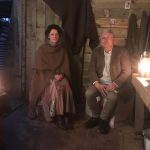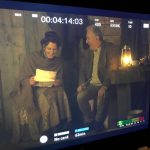Celtic Cafe Interview 2007
Article Courtesy of Celticcafe.com
The exceptional Irish soprano Deirdre Shannon recently appeared on the radio show No Celtic Boundaries, broadcasting from Scotland. Deirdre and the show’s host, Charles Dewhurst, have been kind enough to allow us to share this interview with you.
Deirdre’s debut album, released in 2006, received No Celtic Boundaries‘ Album of the Year award for 2006, and one of the tracks, ‘The Prayer’ won the 2006 Celtic Radio Music Award in the “Roots Traditional” category. She is currently touring in Canada (through April 2007); visit her website for more details, or to order her album (available in MP3 format as well).
Charles Dewhurst: Welcome to today’s show of No Celtic Boundaries!
Deirdre, you recently brought out your debut album, and I must thank a mutual friend of ours, Rod Quinn, for introducing us. For those who don’t know him, Rod Quinn is your drummer who has played with so many famous people.
I have just spent an amazing few days with both yourself and the Celtic Tenors on the Dutch leg of your tour, and I must admit to coming over to Holland with some preconceived ideas about what it was going to be like. I have never before been so badly wrong in my life. You are all so warm and welcoming. Fame and glory has not gone to your heads.
Please tell me a little bit about your life before Deirdre Shannon’s career took off.
Deirdre: For me, the beauty of music lies in what it can communicate. Healing, relaxation, good health – all these positive aspects can be promoted through the power of music. Its power always astounds me! Singing is what I do best and in order to be a good communicator and enhance people’s lives, one must be true to oneself. I must admit that I always endeavour to be myself – that has been a top priority for me from the beginning of this career. I am not very much of an actor; I tend to be ‘straight down the line’. I am comfortable and happy just being myself.
My personal life is very much influenced by nature and the countryside. I love open skies and trees. When I look at a tree that has been growing for 200 years or more I admire it for only taking its cues from the changing seasons – it never grows faster or slower just to fit in with the the hectic lifestyles people fashion for themselves these days. There’s something very calming in that. Whenever I get my tour schedule it always jars with me since it demands that I be away at a very specific time (seasonally speaking).
I always carry a camera about with me just in case I see colours or textures that I really like. I guess I am pretty visually aware, since I studied and got my primary degree in design.
Another huge influence is my family. I am very close to them and relish having contact with them. A healthy family life, I feel, is the key to balance and stability in life. I know how lucky I am to have that and hope that I never take them for granted.
Charles: In your early days you were a relatively unknown name, right out of the Dublin College of Music. You then started with the amazing Irish choir Anúna. Would you actually say that this was the starting point of what was to become a pretty spectacular journey for you?
Deirdre: A good question and I would have to say ‘yes’ is the short answer to that.
I came straight out of both colleges (Art and Music) with lots of options to hand. I could have really taken any direction careerwise. I tried to make a living for a while with my own business as a textile designer, specialising in interior lighting. This was before the Irish economic boom ( the ‘Celtic Tiger’) and I found it just about impossible to make a living. The outcome may have been very different if it had have been a few years later!
As a young musician I had always admired Anúna. This amazing choir was considered one of the most exclusive singing groups in the country. I had the good fortune to be auditioned for the choir, quite by chance, when I met with one of the McGlynn brothers. I have to say that being accepted was the first real endorsement of my own ability as a singer. It turned out to be the beginning of a 10-year professional musical journey (to date)!
Charles: In 1997, Lady Luck really did shine upon you when that wonderful Irish choreographer Michael Flatley cast you in the role of Erin the Goddess in his amazing show, Lord of the Dance. I presume that was the platform for you to shine in, to take you to places that you could only ever before have dreamt about?
Deirdre: Yes; like you said, in 1997, Michael cast me in that role. I have never been a ‘stargazer’ and had never really thought of myself being in a glitzy show like Lord of the Dance. However, I went with the flow and really enjoyed it. I think it was that aspect that Michael especially liked about me.
I’ve been very fortunate to meet many famous people since then and they are all greeted the same way by me. When you’re touring with so many talented individuals and living in each others’ pockets day after day, you must be able to keep your feet firmly on Planet Earth. That has always been one of my major principles in this business – to maintain a down-to-earth attitude to everything no matter how overwhelming things get.
Charles: I was going to ask, what was it like touring with such a large and talented group of individuals?
Deirdre: Great – but not easy! The organisation and touring aspects of such a big production are a logistical challenge for everyone involved. I was touring for two or three months at a time, often with seven or even eight shows per week! That’s a lot of work, considering you have to travel from place to place on top of that. You must remember that Lord of the Dance is a global production. I concentrated on the Americas: I toured from Canada down through Central America, out to the Islands, and through South America – Argentina, Brazil and Chile. It was an intensely busy time for everyone, but needless to say a wonderfully rich experience!
I stayed with the troupe for four years. I have to admit that it took me a year or so, after leavingLord of the Dance, to stop spinning. I had the most remarkable time during this period; I even got the chance to meet and spend some time with many famous people like Tom Petty, Neill Young, Paul McCartney, Shania Twain, David Crosby, Steven Stills and Stevie Nicks. When I think back now it is rather like a dream!
Charles: I had the pleasure of attending Lord of the Dance in Las Vegas in 2002 at the New York-New York Hotel and Casino, a year or so after you left. To say I was blown away must be an understatement. Every aspect of the show was amazing.
Deirdre, you sang with a very talented pianist, Eily O’Grady. This was a very much more intimate thing, totally different from what you had done with Anúna and Lord of the Dance. Was this better preparation for you in furthering your solo career?
Deirdre: Yes, quite definitely. It was a much more intimate experience for me. The type of music performed by both Eily and her sister Geraldine O’Grady, a brilliant violinist, was different to what I had previously been exposed to in a professional capacity. These two have been working in the industry for such a long time that their experience is vast! They took me under their wings, and as it was a classical show I wore my classical hat.
Because it was more intimate, l had to consider things in a slightly different way; for instance, speaking, and the introduction of songs, along with being integrated with other musicians on the stage. Improvisation played a larger role, whereas Lord of the Dancewas a stage show and you were cast in a static role. So yes, it certainly did prepare me for other important aspects of solo performance.
Charles: At what point in this amazing journey did you realise that you actually wanted to go solo? Were you given a push by David Munro to follow that path?
Deirdre: It was encouragement from all sides that took me down the soloist path. I’m afraid I am very hard work when it comes to being pushy about any talent I may have!
I became the guest artist with the Celtic Tenors after I left Lord of the Dance and that’s when I met David Munro, who is their musical director. He constantly encouraged me and provided positive critique on my singing. This feedback developed a ‘muscle’ in my head and boosted my confidence, which was a vital step forward for me. David has always been such a supportive and passionate musician – I had heard that from numerous fellow musicians in both the opera and recording music scenes in Ireland and the UK.
The support I was getting from audiences, with their constant demands for an album, finally convinced me that it was the right time to go this direction. It made me think, “I really need to get my act together,” and so that was what I did.
Charles: Your new album features quite an amount of traditional material. As a classically trained soprano, did you find it difficult to change your approach to enable you to deal with more traditional styles? Does it all come quite easily to you now?
Deirdre: Well, I think that when you are learning music and going though the whole educational process, you have certain leanings and certain inclinations to sing certain things. My leaning was always toward my own native Irish music.
Even though I was classically trained, I think I always felt a little bit more comfortable with Irish music. That’s not to say that I was uncomfortable singing leider. Not at all! There is a lot more fun to be had with folk music though, given that it is such a vibrant community here in Ireland. Musicians in the Irish music community are often willing to help out each other out. People like Rod Quinn (the drummer) from Dublin, Bill Shanley (guitarist) from Cork and David Munro (pianist and producer of my album) from Glasgow have become part of my own music community. I like to think of them as ‘my extended musical family’.
Being ‘classically trained’ is a phrase which gets bandied around freely and, I think, is often used by people who fear that their musicianship is of a second-rate variety. My view is as follows: to be a good singer you need good technique; if some people pursue the operatic stage and others go down a more commercial route, so be it, but if you are to sustain a consistent career with a voice, the same training is relevant to all.
Charles: You have done us here in Scotland incredible justice in one of the tracks that you have recorded – that amazing love song that Robert Burns wrote for his love just before they parted, ‘Ae Fond Kiss’. How did you actually get round to choosing that particular track?
Deirdre: Hmmmm. That’s a hard one, that!! ‘Ae Fond Kiss’ is my favourite track on the album, and I’m not just saying that because this is an interview for a Scottish Radio programme or because a Scotsman, David Munro, is my producer.
Robbie Burns has written some incredible material that I had been introduced to by many people on my travels around the world. There is so much depth of emotion in ‘Ae Fond Kiss’ – I think that was the main reason behind choosing that particular track. It is such a sad song, full of strife telling of unrequited love from Burns’ one true love, Agnes McLehose.
I must admit to being attracted to sad songs and I think that harks from being Irish. There is so much beautiful material in Scottish and Irish culture that has been inspired by such sad situations as poverty, emigration and invasion.
Charles: One of my favourite tracks on your album is the lovely Irish Gaelic song ‘Ardaigh Cuain’. Where did it come from?
Deirdre: Another of my sad ones. This one, like a lot of other tracks, is about emigration. It tells the tale about a man from Donegal who has to work to provide food for his family; so he emigrates to England and eventually into Scotland. He finally gets to what he considers to be the closest point to Ireland, and so he stays in Ayrshire, where on a clear day he can actually see Ireland and its coastline. The words of the song are very haunting, as this man yearns for the love of both his family and his own native country.
Charles: One of my favourite tracks that you have restored my faith in is ‘She Moved Through the Fair’. In the past there have been many versions of it that have been filled with overcomplicated synthesisation that has taken away from the song. Your version is total quality for the lack of ‘the road that everyone else goes down’.
Slightly different from the rest of the material is the lovely song ‘I Don’t Want to Talk About It’, which I would associate with Rod Stewart. What was your reason behind choosing this song?
Deirdre: You had the Rod Stewart version, now you have the Deirdre Shannon version! I chose this one because I had the luxury of picking my very own favourite songs. Simple as that! I have always liked this one and wanted to sing it for so many years. Of course everyone knows the Rod Stewart version. I always thought that it lent itself very well to ‘Celtic treatment’. So when David and I got together we decided, “Okay, let’s stick a bit of Irish flair into it.” I was helped along by a great musician by the name of Bill Shanley (of Mary Black and Van Morrison fame) who played guitar on it and also sang backing vocals.
Charles: You have talked about David Munro and yourself regarding the input of material for this album. Did you have a lot of say about which material was to be recorded, or was that left for David to deal with?
Deirdre: I actually had been thinking about this for about two years, and when it did happen it happened very quickly. I had given a lot of thought as to what songs would go on the album and wasn’t going to allow myself to be bullied into anything that I was uncomfortable singing. Luckily, that never happened; I got to choose my own material.
I think that when you are making an album, you have to be one hundred percent comfortable with the material that is going to be laid down, and the only way to do that is to choose the material yourself. I was encouraged to do certain tracks but ultimately in the end, the final decision was mine.
Charles: Deirdre, I can only wish you well for both your new album and your success, wherever that might take you. Both you and the Celtic Tenors will certainly remain strong favourites with No Celtic Boundaries for a very long time yet, but we do have to wrap the show up now, but I would like to take a moment to wish you outstanding success with your debut album, and send our congratulations to your producer on bringing you to the attention of the world. Might I also remind you that ‘Album of the Year 2007’ is vacant!!!
Author: Charles Dewhurst


